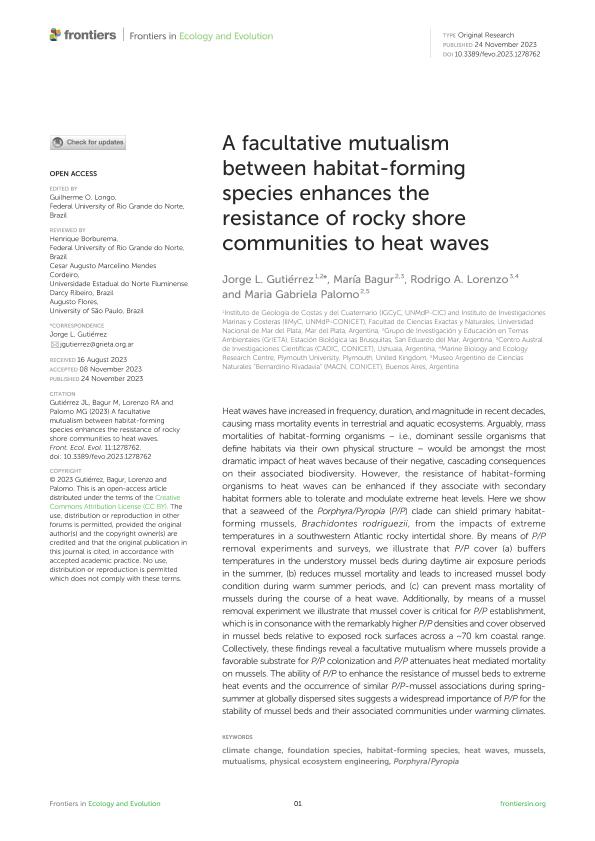Artículo
A facultative mutualism between habitat-forming species enhances the resistance of rocky shore communities to heat waves
Gutierrez, Jorge Luis Ceferino ; Bagur D'andrea, María Sol; Lorenzo, Rodrigo Antonio
; Bagur D'andrea, María Sol; Lorenzo, Rodrigo Antonio ; Palomo, Maria Gabriela
; Palomo, Maria Gabriela
 ; Bagur D'andrea, María Sol; Lorenzo, Rodrigo Antonio
; Bagur D'andrea, María Sol; Lorenzo, Rodrigo Antonio ; Palomo, Maria Gabriela
; Palomo, Maria Gabriela
Fecha de publicación:
11/2023
Editorial:
Frontiers Media
Revista:
Frontiers in Ecology and Evolution
e-ISSN:
2296-701X
Idioma:
Inglés
Tipo de recurso:
Artículo publicado
Clasificación temática:
Resumen
Heat waves have increased in frequency, duration, and magnitude in recent decades, causing mass mortality events in terrestrial and aquatic ecosystems. Arguably, mass mortalities of habitat-forming organisms – i.e., dominant sessile organisms that define habitats via their own physical structure – would be amongst the most dramatic impact of heat waves because of their negative, cascading consequences on their associated biodiversity. However, the resistance of habitat-forming organisms to heat waves can be enhanced if they associate with secondary habitat formers able to tolerate and modulate extreme heat levels. Here we show that a seaweed of the Porphyra/Pyropia (P/P) clade can shield primary habitat-forming mussels, Brachidontes rodriguezii, from the impacts of extreme temperatures in a southwestern Atlantic rocky intertidal shore. By means of P/P removal experiments and surveys, we illustrate that P/P cover (a) buffers temperatures in the understory mussel beds during daytime air exposure periods in the summer, (b) reduces mussel mortality and leads to increased mussel body condition during warm summer periods, and (c) can prevent mass mortality of mussels during the course of a heat wave. Additionally, by means of a mussel removal experiment we illustrate that mussel cover is critical for P/P establishment, which is in consonance with the remarkably higher P/P densities and cover observed in mussel beds relative to exposed rock surfaces across a ~70 km coastal range. Collectively, these findings reveal a facultative mutualism where mussels provide a favorable substrate for P/P colonization and P/P attenuates heat mediated mortality on mussels. The ability of P/P to enhance the resistance of mussel beds to extreme heat events and the occurrence of similar P/P-mussel associations during spring-summer at globally dispersed sites suggests a widespread importance of P/P for the stability of mussel beds and their associated communities under warming climates.
Archivos asociados
Licencia
Identificadores
Colecciones
Articulos(IIMYC)
Articulos de INSTITUTO DE INVESTIGACIONES MARINAS Y COSTERAS
Articulos de INSTITUTO DE INVESTIGACIONES MARINAS Y COSTERAS
Citación
Gutierrez, Jorge Luis Ceferino; Bagur D'andrea, María Sol; Lorenzo, Rodrigo Antonio; Palomo, Maria Gabriela; A facultative mutualism between habitat-forming species enhances the resistance of rocky shore communities to heat waves; Frontiers Media; Frontiers in Ecology and Evolution; 11; 11-2023; 1-13
Compartir
Altmétricas



